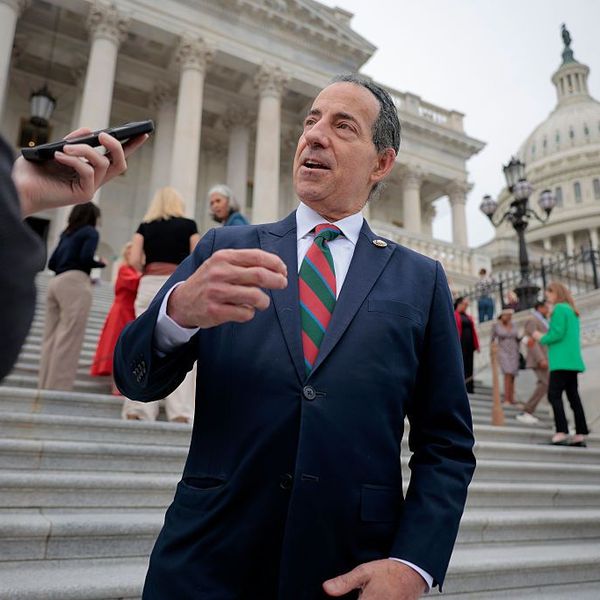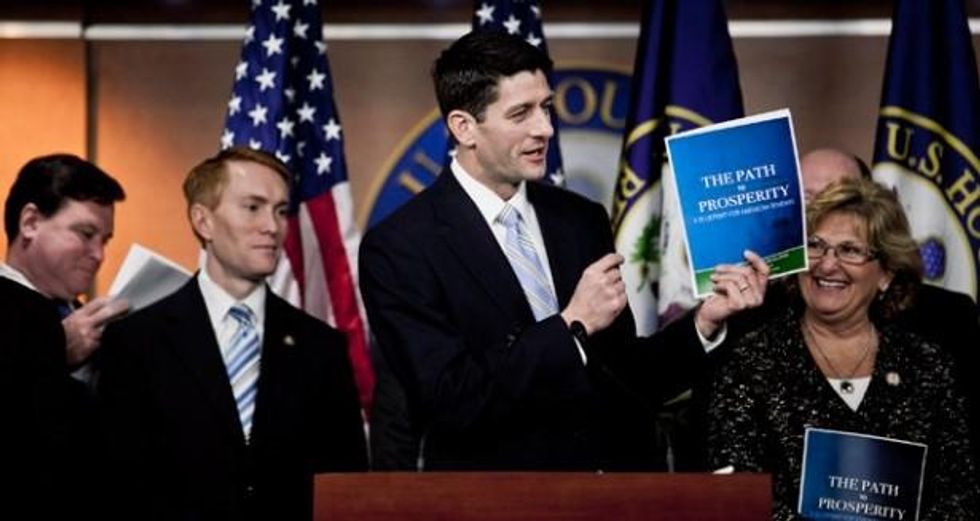GOP House Budget Chair Paul Ryan reigns as the GOP's resident economic genius, even as the productive base and health of his own southeastern Wisconsin district deteriorates under the impact of the very policies he has championed: deregulation, cuts to the social safety net, and "free trade"-fueled offshoring of jobs.
In recent years, Ryan's congressional district has been hollowed out by the loss of major employers like Delco in Oak Creek (3,800 jobs, mostly going to Mexico), Chrysler in Kenosha (850 jobs sent to Mexico with the help of auto industry "bailout" funds), and General Motors in Janesville (a plant closing wiped out 2,800 jobs directly and another 3,000 jobs in nearby supplier plants).
A devotee of hyper-capitalist author Ayn Rand, Ryan has seen the misery and, well, shrugged, just like Rand's Atlas. At least that's what his latest federal budget, which was passed by the House in late March, implies. In the face of suffering in his district and across the nation, Ryan's "Path to Prosperity" would deepen the economic polarization of America by heaping new riches on the 1%. A little-understood provision in it would make the exodus of jobs even worse by creating huge new tax incentives for corporations to relocate more jobs and assets overseas.
Although praised by Mitt Romney as "marvelous," Ryan's plan is so extreme it has gained criticism from even the conservative U.S. Conference of Catholic Bishops and other theologians for its sweeping cuts on programs serving the poor--which comprise about 62 percent of deficit-cutting measures in the budget--despite their tiny share of the overall federal budget. While cutting $3.3 trillion from safety-net programs such as Medicaid and food stamps, Ryan, a practicing Catholic, is all for creating $3 trillion in new tax breaks for corporations and the rich.
A PERNICIOUS PROVISION
Among the most pernicious provisions of Ryan's tax breaks is a plan to halt the authority of the U.S. government to tax the foreign profits of U.S. corporations once they are brought back into the country, notes tax expert David Cay Johnston, author of Free Lunch: How the Wealthiest Americans Enrich Themselves at Government Expense and Stick You With The Bill. Known in right-wing parlance as "extra-territoriality," this proposal would be disastrous to both U.S. jobs and tax revenues.
"Ryan's plan would insure that any profits created offshore by U.S. corporations would never be taxed by the U.S. government," explains Johnston, who won the 2001 Pulitzer Prize for his work as The New York Times' tax reporter. "This would create a tremendous incentive to move more and more U.S. jobs overseas to escape taxes on the profits that foreign workers produce for them," Johnston says.
"Up until now, we've been losing good jobs because CEOs practice a kind of labor 'arbitrage,' seeking the most advantageous place to locate their plants based on low wages," Johnston says. "It doesn't take a genius to see that if your labor costs are about $40 an hour at a major unionized --$27 an hour plus benefits--you can save money if you relocate the work to China where the cost may be $4 an hour or under."
Right now, foreign-generated profits of U.S. firms are not taxed until they are brought back into the United States. But a huge number of multinational corporations like Apple and GE and Nike use a variety of accounting tricks to essentially launder their profits before moving money home.
The key mechanism to this systematic tax avoidance is not the territory in which profits are generated, said Johnston. "Territoriality is a phony issue," he stated "What's critical is the ability of corporations to form hundreds of corporations."
These arrangements permit some subsidiaries to artificially charge other parts of the corporation high fees for the use of logos and brand names, and then to place the real profits in tax havens like the Cayman Islands.
As a result of Apple's complex tax maneuvers, including such exotically-named tricks as "the Double Irish," the corporation has been able to sharply drive down its U.S. tax burden. The impact has been immense, as a recent front-page New York Times investigation concluded:
Without such tactics, Apple's federal tax bill in the United States most likely would have been $2.4 billion higher last year, according to a recent study by a former Treasury Department economist, Martin A. Sullivan. As it stands, the company paid cash taxes of $3.3 billion around the world on its reported profits of $34.2 billion last year, a tax rate of 9.8 percent. (Apple does not disclose what portion of those payments was in the United States, or what portion is assigned to previous or future years.)
Apple is far from exceptional in this respect. GE has been particularly fortunate, Citizens for Tax Justice reported:
Over the past decade, GE's effective federal income tax rate on its $81.2 billion in pretax U.S. profits has been at most 1.8 percent.... GE is one of 30 major U.S. corporations that paid zero - or less - in federal income taxes in the last three years.
But this reality is rarely made visible in our commercial media, which instead uncritically transmit Republicans' incessant claims of uncompetitive and excessive tax burdens. If the Obama campaign is smart, it will seize upon the Romney-endorsed House budget and condemn its favorable treatment of U.S. companies' foreign profits and new incentives for offshoring.



